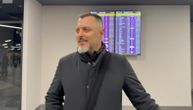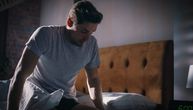MIGRANTS TOLD US THAT THEY HAD THE BEST TREATMENT IN SERBIA: Interview with Ana Koeshall, president of the Ana and Vlade Divac Foundation (PHOTO)
They first put some interest in migrants on July 4, 2015, and decided to go and see for themselves what the situation was. Later on, they started helping more, and the turning point was when Vlade Divac visited the migrants in the park
Serbia and Belgrade showed that they had a big heart during the migrant crisis.
THANK YOU, SERBIA! A migrant from Iraq delivered a baby boy in Leskovac, father in tears!
LIKE US ON FACEBOOK - Telegraf English, or write to us on: office@telegraf.rs
We were all witnesses that many people responded to provide help and ease the stay in our country.
Serbs rushed to help even though they were barely making ends meet, as if they had known that the help will stop the robberies and everything else stemming from poverty.
One of the foundations not immune to the crisis is the Foundation of Ana and Vlade Divac.
According to the data, since August 2015, they have brought help to more than 90.000 refugees in the form of food, clothes, 100 tones all in all.
They made 36.000 meals and 54.000 people got clothes and supplies for personal hygiene.
They set up 14 mobile containers for the refugees to sleep, but also as work place for doctors, 3.000 people got medical help, and 5.000 had a place to sleep.
People from this foundation also put mobile toilets at the border with Bulgaria and in the city of Sid, and they plan to renovate three barracks in the Refugee center in Krnjaca so that they could expand the capacity of the center and provide place for 200 refugees more.
Because of these actions, we spoke with the manager of the Ana and Vlade Divac Foundation, Ana Koeshall, about the migrant crisis and about what the foundation has done so far for the migrants and refugees passing through Serbia.
T: When did you decide to join the humanitarian action of getting the help to the migrants?
- If I remember correctly, it was July 4, 2015. On an event we spoke with our colleagues from the Refugee Center, as well as with several colleagues from NGO sector about many foreign people in the town of Presevo. We were interested in what was going on. We knew the general information, but we did not know that the number is growing by day. During August we had several meetings with the state authorities and we decided to help the people passing through Serbia. In the beginning it was difficult because that was the first time that we dealt with so many people at the same time, the number was 10.000 at one moment. Other people helped us and we learned the ropes pretty quickly.
T: What were your first reactions?
- As the needs grew steadily, we started the first actions in Belgrade because we thought that this situation will be temporary. We started volunteer actions at the bus station park and in Miksaliste. We called the donors and had between 50-60 actions in 2 months. We gave them clothes, water, food, everything which was necessary. In September we started working more diligently. we had several talks during October with international donors who started coming to Serbia because we saw that this will not be something temporary, but steady. We had excellent cooperation with offices of Catholic Relief Services – CRS, International Rescue Committee, Mercy Corps and embassies of Norway and America. We covered almost the whole Serbia territory, including Sid, Dimitrovrad, and Belgrade.
T: The town of Dimitrovgrad was not often mentioned inthe media. Why there?
- Many people were coming through Presevo (up to 10.000), and through Bulgaria only 250-300 people. We chose Dimitrovgrad because those people were financially weaker and took the longer route. They did not get help in Bulgaria and their condition was much harder than in Presevo. They were going on foot, whereas people coming from Greece had transportation. The camp was smaller than of those in Presevo or Sid. many young people (18-25 years) came, and then the families started coming. The only difference was that those people did not have the papers and they were not allowed to go to other countries.
T: How did you help them, since they did not have the documents?
- The refugee center is also posing as border police station. Our role was to get them clothes, food, secure medical help in order to treat the cuts, wounds, and injuries. We want to cooperate with as many institutions as possible, and it is my personal opinion that media can achieve a lot through positive thinking and representing these people. So far we have gathered 100 tons of humanitarian help, and we also secured the containers for the doctors and their teams. It is our plan to continue helping them; it is sad when you force someone to eat just can food every day, so now we can give them also the soup and other things to eat.
I would like to point out that we always buy food from local stores. We ordered a year's supply of clothes from a factory and all of that in a month. In this way we are helping local industry, and the people who got jobs because of the work that had to be done. Soon we will start renovating several barracks in Krnjaca Refugee center and make new toilets for men and women separately.
T: Besides food, water, and clothes, is there something else these people need?
- In the last month, the situation has changed. There are about 2.000 migrants in Serbia, and most of them believe that they will get out and go to EU. However, the policy of EU countries has changed and they will probably have to remain here for the moment. They do not want to accept this. Besides infrastructure, kitchens, and places to sleep, these people should get animated because they are not happy due to the political situation.
STOP THE WAR, NOT THE PEOPLE: Belgrade protested to show support to the refugees (PHOTO)
T: What is the health situation in Belgrade now?
- Compared to Dimitrovgrad, situation in Belgrade was a lot better, even though the number of people was bigger. We secured a pediatrician and a gynecologist, and we took care about culture differences. It was very sad to see a woman who was in pain and the husband would not let a male doctor to examine her. That is why we secured another, female doctor.
T: After all this being said, you have had major contacts with the migrants. What was your biggest impression?
- I will tell you a story from Miksaliste. One day, I noticed 5 young men coming from the doctor's office with bandages on their hands. I saw that they had the same wounds, approached them and asked what the problem was. This young man spoke fluent English, and he told me that they had a real torture in Bulgaria. Namely, Bulgarian police officers played a game with their hands, and were supposedly trying to strike a knife between the fingers on the hands of the migrants. Since they were not that good, they all had wounds. This story was very hard for me to hear, because I learned in one moment how difficult their journey has to be and that everything can change in a matter of couple of days.
When he came to Belgrade, this young man was very happy. He asked if he could borrow my cellphone to send a message through Facebook to his family that he is alright. He was a major star in Afghanistan, he had a TV show, but he started talking against the authorities and he had many problems. His family advised him to run to Europe. We stayed in touch and he is now in Germany, I think, he started working and he is hoping to get another show in the future.
T: You saw good and bad things between migrants and local people. What is your opinion about the reactions of local residents towards migrants?
- Belgrade is a big city and I think we welcomed the refugees that way they deserved. Vlade Divac visited them in September with the representatives of all 4 religious groups: Orthodox, Catholic, Muslim, and Jewish. They talked with the refugees and sent a message that despite religion and nationality, it is our task to help the people who are in trouble. I think that moment changed something in the way we think and it showed that we all depend on each other and that people cannot live alone. But still, it is necessary to work more on this, and that is why we are making a campaign with the goal of getting the right information to the local residents about migrants, the mishaps they had, especially in small communities where foreigners are not seen every day. Of course, fear is absolutely justified, we were all worried after the attacks in Paris and Brussels but we should realize that the people running from the war are not those who are terrorists.
T: Rumor has it that one of the terrorists went through Serbia and Hungary and then came to Paris. Are you afraid of the terrorist attack?
- I really think that terrorists and refugees are not the same. I do not believe that people running with their families are capable of doing something like that. We should not put the blame until we get the proof.
Mrs. Ana Divac, the founder of this Foundation said numerous times that we also had a similar situation and that we know how it is to start from zero. We had the chance of meeting refugees and when asked, they told us that they had the best treatment here in Serbia.
T: What are the future goals of your Foundation?
- We as Foundation have 3 programs: humanitarian help, support and economic help to the endangered groups (the young, parents), and our project of agricultural funds because we strongly believe that agriculture is getting more and more popular and that it has a lot of potential. We give some parts of the funding, and the other part comes from local authorities. In 2015, we helped 193 households in 6 municipalities to start or improve their job; more and more young people are joining this project.
Apart from all of this, I would like to point out two projects more: "One in a million", in which we want to enhance the education chances of children in Serbia. The second one is Divac youth funds - our work with getting jobs for young people. They should go freely to their municipalities and ask for a job. According to our research, 90% of the young people never entered the municipality building in their area, which is devastating. We want to give them strength and make them ready to join in the life of the local communities and to be asked when important things are decided.

